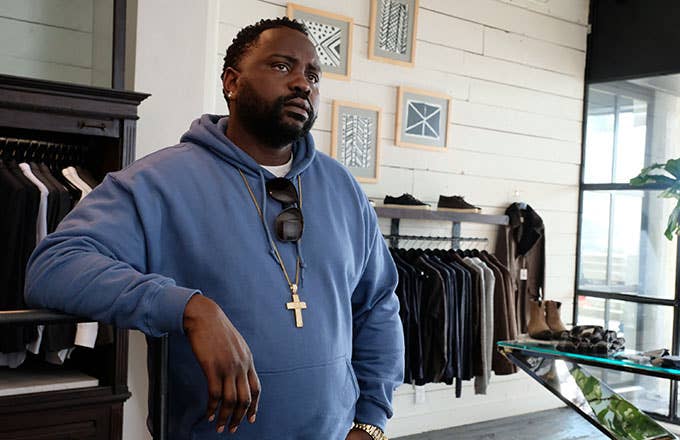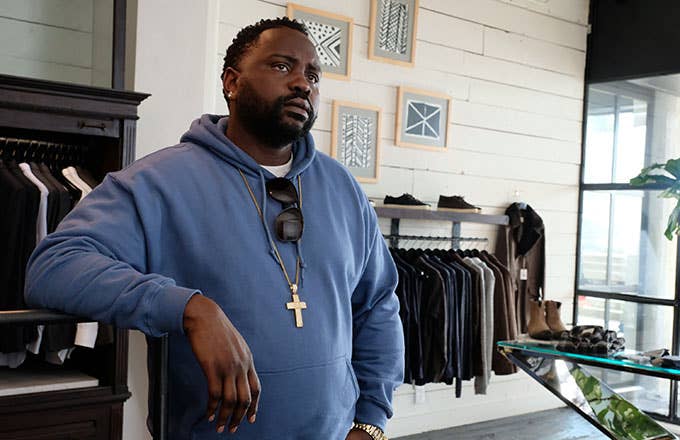
"Woods," the eighth episode of Atlanta Robbin Season, charts Paper Boi's long journey into night over a harrowing half-hour that sees him in mortal danger at least twice. It's the second time in as many weeks that a main, seemingly untouchable character has been in a situation where the stakes felt real enough to fear the show might really go there. It's also the second Alfred episode in the season's back-half trend of favoring character spotlights over ensemble pieces to be written by Stefani Robinson, an original member of Atlanta's staff responsible for past eps like "Juneteenth."
As the only woman in the writers room, the 25 year-old Robinson offers a crucial perspective. She describes her hiring as mix of "the stars aligning" and preparation. Having been interested in writing at a young age, Stefani took the necessary steps to hone her craft through summer programs, college and writing internships: "That all helped me understand the industry from a technical perspective but also from a business perspective and introduced me to a lot of people and contacts." That in turn led to an assistant job at a talent agency, where she clicked with an agent who would eventually become her agent.
Robinson's journey to Atlanta came after her team sent an original pilot she had written to FX just to gauge general interest at the same time Donald Glover was looking to fill one more slot in his writer's room. "My script is there and I'm from Marietta," she says. "I was at the right place at the right time then I got the job and it was very 0 to 60, you know going from grabbing coffee and lunch for people to, you know, someone grabbing me coffee and lunch."
Robinson has since landed an overall deal with FX, and given the work she's done on Atlanta, all eyes will surely be tuned to her next move. But for now, Complex spoke to her about Robbin Season, her pair of Paper Boi episodes, why this season of Atlanta is so damn dark, and more.
I loved this ep but I was a little bugged out because after "Teddy Perkins" I felt like that's it, you guys can't get any sadder than that. Then this got pretty close! This season is shaping up to be pretty dark; how do episodes like "Teddy Perkins" or tonight's episode "Woods" play into the overall theme and vision you guys are going for?
Sorry, it is pretty depressing [laughs]. Well, the theme is Robbin Season as it's obviously in the title, but to dive further into that, I think our characters are in a season of their lives where they are going to eat or be eaten and that's just sort of what they're dealing with and the choices they make as a result of that. In "The Woods" Alfred's dealing with the push-and-pull between fame and being a quote unquote regular person, whatever "regular" means to him. But, yeah, I think overall the season is definitely about these people facing life-changing choices like when we see Van making a choice of, "Am I going to love myself or am I just going to love the idea of being in a relationship?" There are all kinds of things to unpack in "Teddy Perkins" as well, like what what was robbed or taken or what choices were detrimental or positive made within the lives of Teddy, his brother, and all that kind of stuff.
The back half of Robbin Season more or less splits up the ensemble for episodes that spotlight just one core character at a time. What's the reasoning behind that creative decision?
I think the most basic reason for that as I understand it—and that was one of the things that excited me about the fact that we did that—was that it's sort of like a "fuck you" to sitcom structure. I know that's probably a too aggressive way of saying it, but you know so often you see in half-hour comedy shows when you have a really strong ensemble there's a want to always have them together in every episode and the audience is conditioned to expect that. It's weird if everyone in Friends isn't there, it's weird if Seinfeld is missing Jerry for an entire episode. That's what attracted us to telling these types of stories because it feels real. We're sort of playing with the universe and we want to reinforce the fact that these characters have real lives and they're multi-faceted and their lives don't necessarily revolve completely around each other all the time. I'm lucky to have gotten both Paper episodes, and two very different Paper episodes at that.
I don't know if you know this, but since that first Robbin Season promo where you can see Paper Boi's chain getting pulled, there's been a popular internet theory that something bad is going to happen to Alfred. Knowing that only heightened the intensity watching "Woods." Were you guys consciously trying to put us in a head space of assuming something fatally bad could happen?
I think with Atlanta anything bad can happen to anybody. For the show as a whole, I don't think we're afraid of killing anybody [laughs], which is pretty extreme, but those are real stakes and real consequences. Again, I go back to the whole anti sitcom-ness of it all: in real life, sometimes people die and it's not convenient. It's interesting that people picked up on that in the promos and it's all about what's happening thematically and they did a good job of setting the stage for the vibe of this season: very dark, more emotional but also very scary and dangerous. That's Robbin Season as a whole, if you're not being emotionally robbed then you may be physically robbed as well.
This episode almost feels like a culmination of what Alfred's been dealing with throughout the season. It's essentially a more extreme and violent version of the weed dealer episode, where he realizes how his fame has changed his interactions with people.
Right. It's sort of a rehashing of the weed dealer episode because you see that he didn't really learn anything. After his weed dealer robs him, instead of thinking, "Wow, what does this mean for me as a person?" his response is just, "Okay, I need a new dealer." The universe is trying to tell him something, God is trying to tell him something. So we see it again but more violent and scarier. He ignored the first warning and the second came harder and faster and spoke to him in a way where he was more able to look at the situation and make a decision about his life.
we want to reinforce the fact that these characters have real lives and they're multi-faceted and their lives don't necessarily revolve completely around each other all the time.
I don't know how apparent this was, but the episode takes place on the anniversary of his mother's death. It's not the point of the episode, it's just coloring for what's going on. In the beginning we see the shadow of a Mom, and he's upset for the entire episode, there's a cloud over his head. It's an interesting crossroads, that maybe his mother is trying to speak to him. This is a really bad day that he's had but he's learned something from it, it's almost like a tough love thing. He's reminded that he has to choose who he needs to be.
What are we supposed to take from the ending when he agrees to the picture and how that contrasts from his fight with Ciara earlier?
I think you're supposed to take that he's choosing not to be regular anymore. The ending is sort of like a line in the sand, an acknowledgement that, "I'm different, I've made the choice to be different and I'm saying goodbye to all the things that were tying me to being regular."
The woods is an interesting metaphor for that. You look at classic hero journey myths. There's usually a point in the quest where the hero goes through the underworld and they have a brush with death or ghosts and they come out of the other side changed. Alfred goes through the underworld, and the creepy homeless dude in the woods is humming the same gospel song his mom was earlier. There's an intentional otherworldliness to it for sure.
The New Yorker profile on Donald had a cool passage featuring a debate you two had that really seemed like a slice of what the writer's room must be like on the regular.
That's definitely what happens. We are very candid and have deep conversations, in a lot of writer's rooms you are emotional and you have to talk about really personal things if you're trying to write a personal show. But our writer's room feels a little bit more like a family. Well there are some of Donald's family members in there like Steven [Glover], and all of the other writers, they've known each other for such a long time and there's a shorthand they have with each other. It's really nice and cozy. Within that coziness, there's room to bust each other's balls a little bit. I don't think any of us are afraid to argue but not from a point of anger, but from understanding and friendly debate and healthy disagreement [laughs].
There's not a lot of pressure in there, Donald said himself that he's never going to put pressure on us, we should be putting pressure on ourselves. He expects us all to hold up our part of the bargain, and hold ourselves to as high of a standard as he does. I didn't know any of them before coming in though so that was an adjustment period for sure.
What's it like being the only woman in there, and having a different perspective for attacking the story especially when it comes to creating characters like a Ciara?
It's hard [laughs]. I'm so grateful to be a woman of color in a writer's room at all. But at the same time I always wish that there were more women everywhere. It's tricky because things start seeming like they're my fault [laughs]. When people aren't happy with some of the female characters they assume it's a stereotype. But, no, we have very nuanced conversations about each character, but in a lot of ways I'm essentially a lightning rod for that stuff because I'm the only female.
I can already tell you, Twitter will probably think Ciara's character is problematic but I really don't care
It's tough because if you're the only minority you know that you sort of have to represent everybody and it's hard, it's not an ideal situation for anyone to be in but I say that with so much grace and love that I am happy that I am there. The guys in the room are super-responsive to my perspective and they take it into consideration but at the same time I can't speak for all women, or all black women because there's so many different types.
Someone like Ciara, I think is really empowering. She's got kind of a Cardi B vibe to her in that she seizes opportunity. I can already tell you, Twitter will probably think she's problematic but I really don't care [laughs]. I mean, I care, but there are women out there that I've met that are like her and she's specific and she's very forthcoming about what she wants and how she wants to get it. I think it's honest, whether or not people like the portrayal, it's an honest one.
How important was it to you that we see a Van episode that doesn't directly involve her relationship to Earn or any of the other guys?
It was super important to me. It's always going to be the most important thing to me with any female character to illustrate that females do have lives that do not revolve around men. I think whatever project I work on it's extremely important to me that that be explored.
What advice do you have for aspiring young women of color who want to follow your career path?
Write as much as you can, as often as you can and get used to your own voice and try things. The biggest piece of advice I can give is to be yourself, always. Never try to write something that seems like somebody else, always be honest because what choice do you have? You have no other choice but to be honest with yourself, writing and your experience. The most exciting work to me is when you could tell it comes from a specific place. And I would say to be prepared. There's no road map for breaking into Hollywood. What happened to me, how I got staffed on Atlanta will probably never in a million years happen the same way to someone else and I have other friends who have been staffed on shows in really curious and strange ways. So you have to be prepared because something crazy will happen where someone will ask you for a script, someone will ask you to write something. If you're not prepared, you don't have a great script, you don't know what you're doing, you don't know how to write, or if you're afraid the opportunity's going to pass you by. It's almost like getting ready for war: do as much as you can, train yourself as much as you can for the opportunity and when it's there you can seize it fully.
I know we're still in the thick of Robbin Season but we're close enough to the end that I have to ask: what's a season 3 looking like?
[Laughs] I have no idea! To be completely honest, I have no idea, that's definitely a Donald question maybe when he stops being the busiest, famous, most creative person in the world I would have a clearer answer, but I don't know. I hope so, but we'll see.

